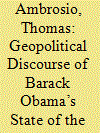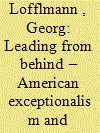| Srl | Item |
| 1 |
ID:
171822


|
|
|
|
|
| Summary/Abstract |
President Barack Obama came to office with the expressed intention of breaking with the geopolitical orientation of his predecessor. Obama argued that George W. Bush overemphasized the Middle East at the expense of the Asia-Pacific region, the war in Afghanistan, rising non-Western states, and domestic affairs. To this end, Obama sought a strategic shift away from the Middle East and toward these other geographic areas. Obama also sought changes to policies which were closely associated with Bush’s focus on the Middle East: counterterrorism, democracy promotion, and foreign military interventions. This article evaluates whether this proposed reorientation away from the Middle East was reflected in Obama’s geopolitical discourse by examining his State of the Union addresses in comparison to those of his predecessor. It finds that these intended changes were largely evident in these speeches in that they exhibited a far greater geographic diversity than Bush’s, reflected adjustments to these policies, and paid substantially more attention to domestic affairs. However, this shift was limited by external events and the Middle East continued to command Obama’s primary focus. These findings reinforce the notion that while leaders seek to shape geopolitical understandings through their discourse, this discourse is in turn restricted by global realities.
|
|
|
|
|
|
|
|
|
|
|
|
|
|
|
|
| 2 |
ID:
138979


|
|
|
|
|
| Summary/Abstract |
This article explores the discursive performance and political significance of ‘American exceptionalism’ under President Obama. Moving beyond a critical examination of geopolitical identity, it investigates how representations of exceptionalism, understood as ideational construct of uniqueness and superiority, are linked to practices of US foreign and security policy that confirm, but also contest, established notions of American leadership in world politics. A particular focus lies on the 2012 presidential campaign, and how diverging ‘exceptionalist’ visions between Obama and Mitt Romney testified to competing ideas for American primacy and cooperative engagement. The article will further examine the cases of ‘leading from behind’ in Libya, American non-intervention against Assad in Syria, and US reactions to current crises concerning Ukraine and ISIS. The contextualisation of these episodes in contemporary, geopolitical discourse reveals how the practice of US foreign and security policy under Obama is shaped by a conflicted and paradoxical vision of post-American hegemony.
|
|
|
|
|
|
|
|
|
|
|
|
|
|
|
|